
On September 16th, 2023, Karyn Lai, Professor of Philosophy at the University of New South Wales, gave an online talk titled “Encountering the Other: The Heart of Mengzi’s Moral Philosophy.” This was the eleventh lecture in the “Collaborative Learning” (Si Hai Wei Xue 四海为学) series hosted by the Philosophy Department at ECNU. The lecture was chaired by Yuhan Liang (University of Connecticut) and comments were provided by Tang Siufu (University of Hong Kong), Franklin Perkins (University of Hawai’i), and Linda Liu Qin (Wuhan University).
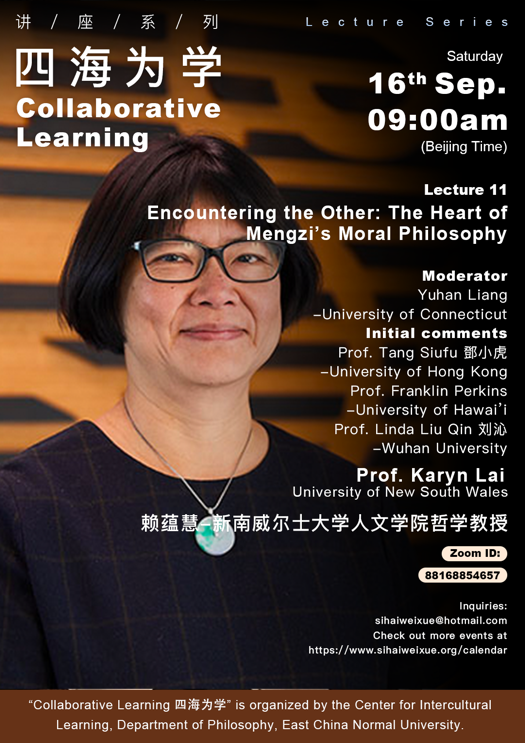
Professor Lai’s talk explored passages in the Mengzi that focus on a person’s encounter with another being that is about to experience pain or suffering, specifically King Xuan’s encounter with the ox being led to the sacrifice (1A7) and the child about to fall in the well (2A6). She finds these passages to be among the most powerful illustrations of Mengzi’s moral heartmind (xin 心).
In 1A7, Mengzi confirms that King Xuan spared an ox from being sacrificed because the king could not bear its trembling. Lai noticed that the focus of the passage is not on the distress of the ox, but rather the moral agent (the king)’s perception of the ox’s distress, which motivates the agent to action. In 2A6, Mengzi points out how seeing a child about to fall in a well will arouse any person’s alarm and distress. Again, Lai notes how Mengzi is clear that it is not the child’s cries that arouse these feelings but rather the person seeing the child in the dangerous position they are in. For Mengzi, both passages are a demonstration that the heartmind cannot bear to see the suffering of others (不忍之心).
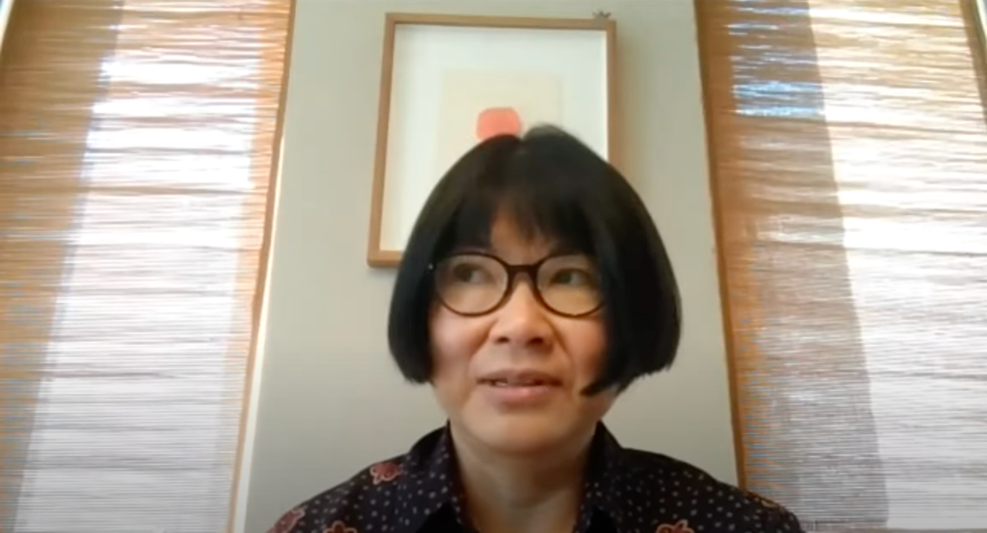
These observations lead Professor Lai to posit the notion of the encounter as a key aspect of Mengzi’s moral philosophy. Returning to 1A7, she asks what is deficient in King Xuan’s approach to the people. As Mengzi notes, the king is deficient not because he lacks the capacity to sympathize adequately with his people, but because his moral priorities are backwards. And his moral priorities are backwards because he has not sought out encounters with his suffering subjects that might correct these priorities. Lai claims that this element of King Xuan’s situation has not been clearly articulated in the scholarship. Mengzi has to describe the people’s suffering to the king because he has not done his job and seen their suffering for himself.
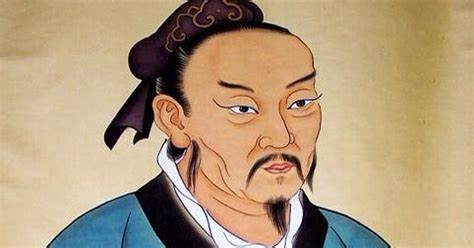
This also points to what would be wrong with the King visiting the kitchen and seeing the animals that are slaughtered there. It is not that kindness towards animals is intrinsically bad, but rather that the King should be among the people, not in the kitchen.
In the final part of her presentation, Professor Lai asked what do these stories do for us, the readers? We are a step removed from the stories and don’t directly encounter these people who are suffering or close to suffering. Nor are we supposed to be convinced to be moral by the text. Rather, Professor Lai posits that the authors would have hoped that readers could engage imaginatively with the examples given and reflect on them. By imaginatively engaging with them and noticing our responses, we empirically verify Mengzi’s claims about the heartmind, that the four roots of virtue manifest in encounters with another’s distress. And by reflecting, we can think about what or who it is they need to attend to in their own lives. Before talking to Mengzi, King Xuan had reflected on his encounter with the ox without success, but during his conversation his heartmind was stirred. Similarly, the text can lead us through a kind of guided reflection that may not be accessible otherwise.
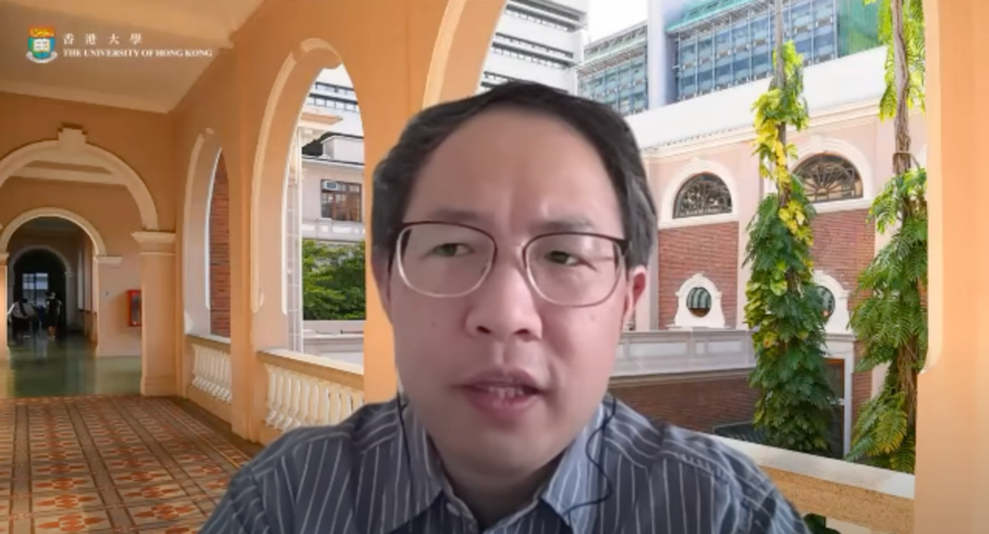
After Professor Lai finished her presentation, the three commentators provided comments and questions. Professor Tang Siufu agreed that a key aspect of 1A7 is King Xuan’s need to visit his people and see their suffering. But he had a question about this: what about when we encounter others but fail to see their suffering? For example, we might think that they deserve their suffering and rationalize away their tragedy in some way.

Franklin Perkins pursued a similar line of questioning. He asked about the subjective aspect of an encounter: While it’s hard to see the child on the edge the well with anything besides alarm and fear, King Xuan must have seen an ox being led to slaughter before and not reacted as he did. What does he see it differently this time? Mengzi just uses the verb jian 见 (“see”) to describe what the King does, so it’s not clear that he addresses this in the text. Professor Perkins contrasted this to 4B29, where si 思 (“think”) is used. Overall, Professor Perkins took Lai’s reading of the Mengzi as a convincing argument against segregation. He noted that while today people are so interconnected, we are also isolated from the suffering of the people we are connected to.
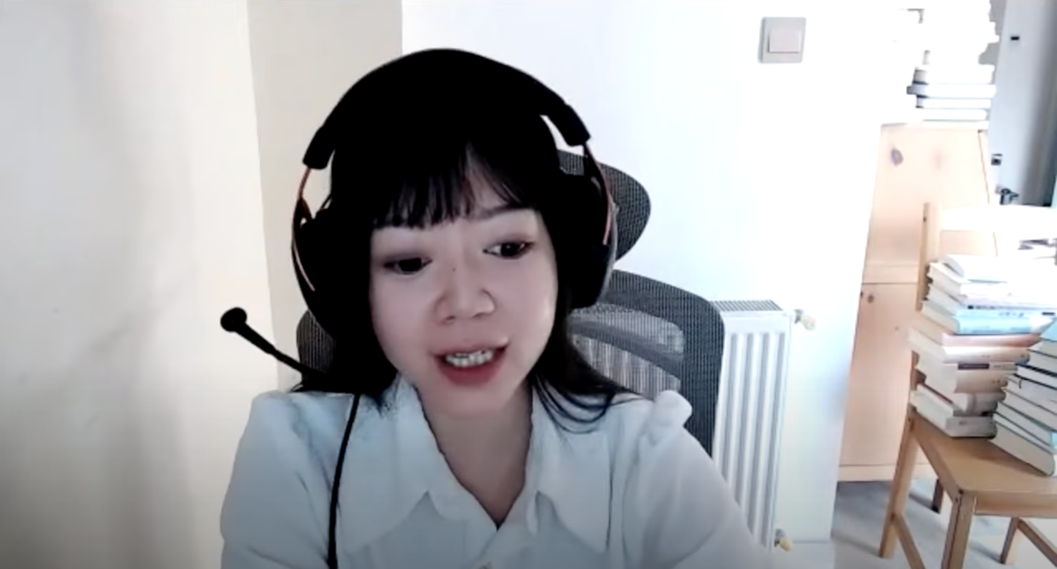
Liu Qing provided final comments. She remarked that we see only see the appearance of the being, and our judgement of their feelings and emotions comes from reflection. Nobody asked the ox how it feels. There is a gap between the emotion we think is there and what is actually there.
Professor Lai remarked further on how the disposition or capacity to feel a certain way in 2A6 is supposed to be universal. She noted that this universality is meant to be unremarkable. Mengzi’s claim is akin to the fact that “as humans we all have human DNA” despite the fact that some humans do not have a complete set of DNA. The point is that exceptions are rare and mark one as abnormal. Therefore, the often-raised psychopath problem is not very worrisome for her.
A harder problem is the everyday of experience of seeing something and having no reaction to it, not seeing pain as pain. She said that in this case, perhaps si and jian are not talking to quan 权 (the mental capacity of weighing). She said this also points to the importance of learning from exemplary people about how to see and react to things, and how the encounter with the exemplary person is another important encounter for Mengzi. She said the discussions in 6A about the creation of a morally beneficial environment are very important. However, she also noted that we should remember that Mengzi is modest with his claims in 2A6: he doesn’t say that having those responses are the necessary and sufficient conditions for moral action.
Report by Henry Allen

 学校主页
学校主页 校内链接
校内链接 校外链接
校外链接 校内邮箱
校内邮箱




